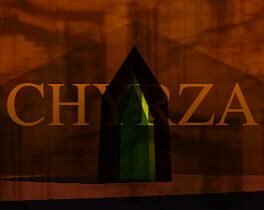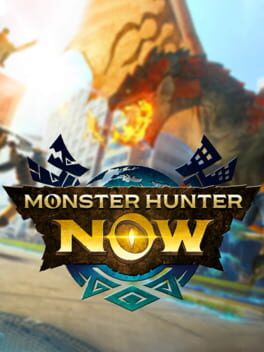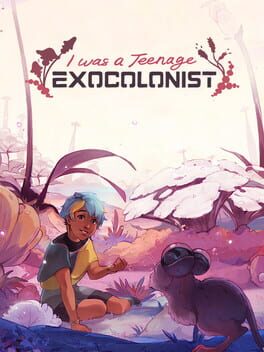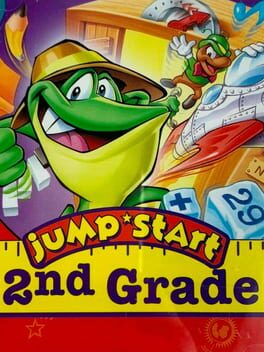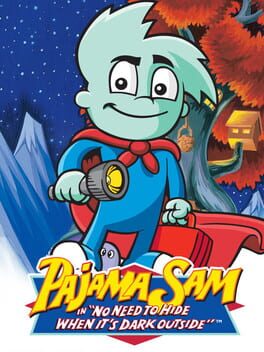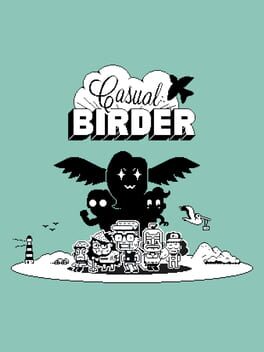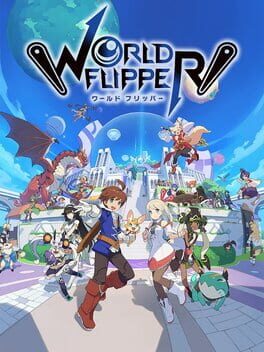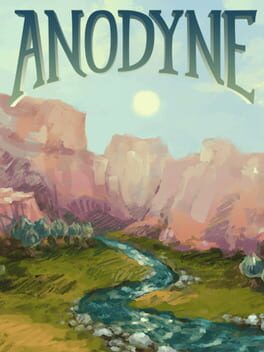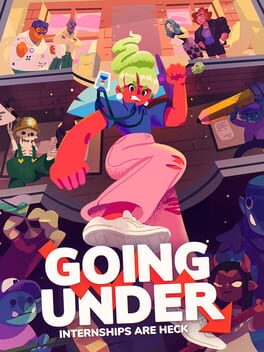disasterfemme
38 Reviews liked by disasterfemme
This is hands down the best and most relevant Monster Hunter game if you want to check out the classic style. Hunting Styles and hunter Arts were imo the best addition to this franchise. It's also jackful of content that will keep you busy for at least 600 hours until you grow tired and want to play something else.
This is the pinnacle of old school Monster Hunter. There's so much in this game it borders on too much at times. As a last hurrah to the classic style of Monster Hunter gameplay before World/Rise, this is the best they could have possible done. I will be playing this game on my deathbed and still not have finished everything.
Chyrza
2014
Really liked this one. Its got great atmosphere right off the bat, thanks to its striking duo tone color-scheme, abstract architecture, and surreal setting. The small bits of voice acting put together a vague but relatively interesting story about a small village and the malicious world they live in. A good 15 minute playthrough.
Anatomy
2016
Monster Hunter Now
2023
Turns out the way to get me to play a roguelite deckbuilder is to make it a life sim where the runs are 5-8 hours long and the cards are tied to the narrative.
In I Was a Teenage Exocolonist, you play as the eponymous teenage exocolonist (who knew?), born on a colony ship bound for the planet "Vertumna". The ship lands when you are age 10 and the game continues until age 20. Each year has various bespoke narrative events and about a dozen "turns" where you can grow your stats and manage your relationships.
Notable narrative events award you a new card, the deck contextualized as your memories. Cards have suits (yellow for social, blue for mental, red for physical), a number value, and possibly an extra effect like "+1 during mental challenges". For skill checks, you draw a hand from your deck and try to beat the goal number with the card slots available. You get extra bonuses from pairs, straights, flushes, et cetera. If you puzzle out the highest possible value with your cards, you get a minor cash reward. If you can't hit the goal, you can take a stress penalty to push through anyway.
It's a solid gameplay loop that carried me through a couple runs before I eventually turned on Debug Mode to skip every card battle and tweak stats to my liking (humans are just human, yeah?). There's also an option to ignore the cards entirely and turn the challenges into straight stat checks, if you're into that.
Of course, I wouldn't have cared about the cards and deckbuilding if not for the narrative context in which they exist. But the writing is... uh. Well. It doesn't really jive with my personal tastes, but I think it would for a lot of people. Another review (positively) describes the game as "queer socialist propaganda", and I can't really disagree with that assessment. I appreciate the game's politics, but not its aesthetic.
The colony is some kind of anti-capitalist, communal child-care, anti-cultural, vegetarian collective. You can change your name, appearance, and pronouns at any time along a spectrum of female-presenting to male-presenting. There are multiple romanceable characters across the LGBTQ+ spectrum and the game lets you date any of them, though that doesn't mean the relationship will always work out. It's better than I expected from a game that puts "you can date a dog-boy" on its Steam page, at least.
This is also a time loop story, which helps contextualize multiple playthroughs and allows you to pick options on later runs that help optimize your new life (a unique narrative strength of video games as a medium that has been insidiously co-opted by the isekai genre). For example, instead of spending several months figuring out a solution to an impending famine, you can guide characters directly to a solution you figured out last time, saving lives and giving you more time to spend patrolling the walls or repairing robots. Figure out someone's likes and dislikes, and those will stay in their character window in the next run.
But with one foot firmly embedded in the Twee Zone, Exocolonist could headline a Wholesome Direct (derogatory). Your menu doesn't have an Achievements section, it has a "Cheevos" section. Vertumna is cast entirely in pastel blues, pinks, and yellows; populated by aliens like "floatcows" and "unisaurs". Every character has a cutesy hippy name that's shortened from a longer word, so you're hanging out with Marz (Marzipan), Kom (Kombucha), Tonin (Melatonin), Seeq (Obsequious), et cetera. The fictional space sport is literally called "sportsball". Un-fucking-bearable.
The game advertises a large number of endings, but it's more of an Obsidian-style modular ending slides thing. Depending on what jobs you picked most often and the status of your relationships, you get some paragraphs about how they all turned out. I played enough to get three different job-related endings and most of the bespoke endings that require more specific sequences of events, and my Steam runtime is listed at about 35 hours. Though, as noted, this was with me using Debug Mode to speed up later runs considerably.
Despite my issues, I'd say enjoyed my time with Exocolonist. While I'd love to see its broad structure applied to an aesthetic I find more personally appealing, its (relative) simplicity compared to the big RPGs I usually play starts the creative gears turning in my head. Whether it's actually realistic or not, games like this and Citizen Sleeper make me wonder if this is something I could do one day, as late a start as it might be.
A thought for another day, perhaps.
In I Was a Teenage Exocolonist, you play as the eponymous teenage exocolonist (who knew?), born on a colony ship bound for the planet "Vertumna". The ship lands when you are age 10 and the game continues until age 20. Each year has various bespoke narrative events and about a dozen "turns" where you can grow your stats and manage your relationships.
Notable narrative events award you a new card, the deck contextualized as your memories. Cards have suits (yellow for social, blue for mental, red for physical), a number value, and possibly an extra effect like "+1 during mental challenges". For skill checks, you draw a hand from your deck and try to beat the goal number with the card slots available. You get extra bonuses from pairs, straights, flushes, et cetera. If you puzzle out the highest possible value with your cards, you get a minor cash reward. If you can't hit the goal, you can take a stress penalty to push through anyway.
It's a solid gameplay loop that carried me through a couple runs before I eventually turned on Debug Mode to skip every card battle and tweak stats to my liking (humans are just human, yeah?). There's also an option to ignore the cards entirely and turn the challenges into straight stat checks, if you're into that.
Of course, I wouldn't have cared about the cards and deckbuilding if not for the narrative context in which they exist. But the writing is... uh. Well. It doesn't really jive with my personal tastes, but I think it would for a lot of people. Another review (positively) describes the game as "queer socialist propaganda", and I can't really disagree with that assessment. I appreciate the game's politics, but not its aesthetic.
The colony is some kind of anti-capitalist, communal child-care, anti-cultural, vegetarian collective. You can change your name, appearance, and pronouns at any time along a spectrum of female-presenting to male-presenting. There are multiple romanceable characters across the LGBTQ+ spectrum and the game lets you date any of them, though that doesn't mean the relationship will always work out. It's better than I expected from a game that puts "you can date a dog-boy" on its Steam page, at least.
This is also a time loop story, which helps contextualize multiple playthroughs and allows you to pick options on later runs that help optimize your new life (a unique narrative strength of video games as a medium that has been insidiously co-opted by the isekai genre). For example, instead of spending several months figuring out a solution to an impending famine, you can guide characters directly to a solution you figured out last time, saving lives and giving you more time to spend patrolling the walls or repairing robots. Figure out someone's likes and dislikes, and those will stay in their character window in the next run.
But with one foot firmly embedded in the Twee Zone, Exocolonist could headline a Wholesome Direct (derogatory). Your menu doesn't have an Achievements section, it has a "Cheevos" section. Vertumna is cast entirely in pastel blues, pinks, and yellows; populated by aliens like "floatcows" and "unisaurs". Every character has a cutesy hippy name that's shortened from a longer word, so you're hanging out with Marz (Marzipan), Kom (Kombucha), Tonin (Melatonin), Seeq (Obsequious), et cetera. The fictional space sport is literally called "sportsball". Un-fucking-bearable.
The game advertises a large number of endings, but it's more of an Obsidian-style modular ending slides thing. Depending on what jobs you picked most often and the status of your relationships, you get some paragraphs about how they all turned out. I played enough to get three different job-related endings and most of the bespoke endings that require more specific sequences of events, and my Steam runtime is listed at about 35 hours. Though, as noted, this was with me using Debug Mode to speed up later runs considerably.
Despite my issues, I'd say enjoyed my time with Exocolonist. While I'd love to see its broad structure applied to an aesthetic I find more personally appealing, its (relative) simplicity compared to the big RPGs I usually play starts the creative gears turning in my head. Whether it's actually realistic or not, games like this and Citizen Sleeper make me wonder if this is something I could do one day, as late a start as it might be.
A thought for another day, perhaps.
JumpStart 2nd Grade
1996
Preface: I grew up on these JumpStart games and have now built a Windows 98 machine so my kids can play them. As these are educational games, my review is based on how much I learned and how much I enjoyed them as a kid, as well as how my kids are doing with them now.
This is where things get interesting. CJ the frog is an analog for Indiana Jones, and the mini quests you go on while searching for treasure are great. The sense of adventure really motivated me as a kid to keep going and to figure out the puzzles. As a dad, I'm glad those puzzles are helping my kids in school. Solid edutainment.
This is where things get interesting. CJ the frog is an analog for Indiana Jones, and the mini quests you go on while searching for treasure are great. The sense of adventure really motivated me as a kid to keep going and to figure out the puzzles. As a dad, I'm glad those puzzles are helping my kids in school. Solid edutainment.
Casual Birder
2022
World Flipper
2021
🎇🥘🍄🛠🌝🌚🌈🪩🔮⚔️🎆
i’m pretty stormy about a high energy anime pinball RPG being stuck to a gacha format like this, because it’s never going to be as fun as it could be. it also kind of needs to exist in this space to make sense as an unfolding layered team builder. i’ve had some satisfying highs from months of buildup with this game, but everything’s tilting so much that we’re starting to plateau.
after putting together the tools for the hilariously cool sounding ‘dark multiball’ team, i think my time with this game is come to a close. other fun builds i’ve put together are levitate combo, dragon powerflip, and coffin count, all with the help of the small & dedicated world flipper community. a handful of lovingly detailed spreadsheets exist on the internet, explaining how various obscure mechanics can work together for optimal play. there’s no sense of competition between players (other than bragging rights), since online play is collaborative. better teams for one mean better runs for all.
this isn’t to say that players are the only ones bringing character to the table. the worlds of world flipper push their bubbly shonen trappings to the extreme:
🧜🏻♀️ a brash isekaied pirate captain has a flirty mermaid princess follow her around
☁️ a freed beastman prisoner found in one world is increasingly implied to be the missing heir of another
🗡 a cursed hero must teach & rely on others as he learns the true machinations of the imperial systems he once served
and those are just beats from the a-plot! hundreds of side characters come with individual vignette episodes when you pull them, fleshing out their deal & the universe as a whole. it’s a mess of a story, but the love put into it is obvious, tropes and all. countless lone wolf characters are won over by a warm welcome from the main quartet with a home cooked meal. biweekly gag comics add an element of slapstick to the cast that rounds out their darker moments. there’s an optimistic complexity that shows you broken characters building something outside what should be possible together. how can you not get inspired?
so, it’s all a good time, until we look at the pieces needed to keep this engine running. along all the fanfare and fun, grinding for materials takes up about 95% of the game. these will let you build your ideal teams, unlock new abilities & equip game-changing weapons. it’s even fun when your newly finished team gives you the tools to tackle content for characters of another element! you’ll get to play with your new kit, characters bouncing around the course casting flashy abilities every few seconds. each round is like an interactive fireworks show. well designed teams will weave intricate combos that create a fun engine to tackle different types of levels.
but then you need to grind more. and more. and the power creep starts to settle in. harder bosses require newer, more optimal characters, who you also need to upgrade. victories stop meaning as much & the temptation to turn on auto battle grows.
ultimately, this is what keeps people around for online games, not just gachas. there’s a sense of progression that’s encouraging to see your characters go through every day as you work through your own personal battles. your work hours may be unbalanced as all hell, but you can whip your phone out in a free moment and get your dailies done. it’s like casting a small spell, a personal prayer for a better tomorrow.
i defs needed this prayer over the last year and a half, unintentionally lining up with my bout of long covid i’ve had to claw my way through. money is tight, and i’ve been able to build almost every optimal team with little more than luck, patience & consistency. most days logging on & watching the auto battles play out was the only thing my brain could manage.
things are starting to change, though. i just got on disability after working towards it for over a year, and i’m finding that things are very slowly starting to get better. i’m able to get out of bed about half of the week, and i’m looking to see what i want to change with my new options. world flipper feels like it’s been played through at this point, so i think i’m ready to take it out of the routine.
i’ll probably come back to play through the new plot beats, but those take so long to come out. i honestly think that with the teams i have now, i can come back in 6 months to play a bit & peace out again! there’s something reassuring to finding your own ending to a game, and i think i’ve got mine.
i’m pretty stormy about a high energy anime pinball RPG being stuck to a gacha format like this, because it’s never going to be as fun as it could be. it also kind of needs to exist in this space to make sense as an unfolding layered team builder. i’ve had some satisfying highs from months of buildup with this game, but everything’s tilting so much that we’re starting to plateau.
after putting together the tools for the hilariously cool sounding ‘dark multiball’ team, i think my time with this game is come to a close. other fun builds i’ve put together are levitate combo, dragon powerflip, and coffin count, all with the help of the small & dedicated world flipper community. a handful of lovingly detailed spreadsheets exist on the internet, explaining how various obscure mechanics can work together for optimal play. there’s no sense of competition between players (other than bragging rights), since online play is collaborative. better teams for one mean better runs for all.
this isn’t to say that players are the only ones bringing character to the table. the worlds of world flipper push their bubbly shonen trappings to the extreme:
🧜🏻♀️ a brash isekaied pirate captain has a flirty mermaid princess follow her around
☁️ a freed beastman prisoner found in one world is increasingly implied to be the missing heir of another
🗡 a cursed hero must teach & rely on others as he learns the true machinations of the imperial systems he once served
and those are just beats from the a-plot! hundreds of side characters come with individual vignette episodes when you pull them, fleshing out their deal & the universe as a whole. it’s a mess of a story, but the love put into it is obvious, tropes and all. countless lone wolf characters are won over by a warm welcome from the main quartet with a home cooked meal. biweekly gag comics add an element of slapstick to the cast that rounds out their darker moments. there’s an optimistic complexity that shows you broken characters building something outside what should be possible together. how can you not get inspired?
so, it’s all a good time, until we look at the pieces needed to keep this engine running. along all the fanfare and fun, grinding for materials takes up about 95% of the game. these will let you build your ideal teams, unlock new abilities & equip game-changing weapons. it’s even fun when your newly finished team gives you the tools to tackle content for characters of another element! you’ll get to play with your new kit, characters bouncing around the course casting flashy abilities every few seconds. each round is like an interactive fireworks show. well designed teams will weave intricate combos that create a fun engine to tackle different types of levels.
but then you need to grind more. and more. and the power creep starts to settle in. harder bosses require newer, more optimal characters, who you also need to upgrade. victories stop meaning as much & the temptation to turn on auto battle grows.
ultimately, this is what keeps people around for online games, not just gachas. there’s a sense of progression that’s encouraging to see your characters go through every day as you work through your own personal battles. your work hours may be unbalanced as all hell, but you can whip your phone out in a free moment and get your dailies done. it’s like casting a small spell, a personal prayer for a better tomorrow.
i defs needed this prayer over the last year and a half, unintentionally lining up with my bout of long covid i’ve had to claw my way through. money is tight, and i’ve been able to build almost every optimal team with little more than luck, patience & consistency. most days logging on & watching the auto battles play out was the only thing my brain could manage.
things are starting to change, though. i just got on disability after working towards it for over a year, and i’m finding that things are very slowly starting to get better. i’m able to get out of bed about half of the week, and i’m looking to see what i want to change with my new options. world flipper feels like it’s been played through at this point, so i think i’m ready to take it out of the routine.
i’ll probably come back to play through the new plot beats, but those take so long to come out. i honestly think that with the teams i have now, i can come back in 6 months to play a bit & peace out again! there’s something reassuring to finding your own ending to a game, and i think i’ve got mine.
Persona 4 Golden
2012
My original review for Persona 4 read "eeeeuuuugghhhghhhhgghghghghhgghgfhfghfdgsdhfgfdg". That is basically the full extent of my thoughts on this game, but I feel the need to elucidate further anyways.
I am not going to comment on the portrayal and handling of LGBT themes in this game. Instead I will state that the way that Kanji and Naoto are portrayed and handled is not even a particularly unique problem, and is representative of the greater issue with the game at large: Persona 4 has absolutely nothing to say, and any attempts at a greater statement it dares to make fall flat after it makes one or two steps.
On paper, the formula behind every member of the main cast of Persona 4 is as follows: person has problem or insecurity they feel ashamed of, person faces and accepts this issue as a part of themselves, person now feels comfortable in their own skin having accepted themselves inside and out. In execution, it is usually an exercise in characters repressing any divergent tendencies they might have and falling in with the rest of society and pretending like they're fine with that.
The problem is not that Naoto is not portrayed as a trans man, it is that any possibility of the character being anything but a cisgender woman is immediately stamped out and dismissed as something that must be "overcome" rather than being a unique quirk that is uniquely a part of her identity that she is allowed to embrace and feel proud of. The problem is not that Kanji's sexuality is only implied at best and a target of harassment at worst, it is that attraction to men is treated as something to be ashamed of and then never addressed as anything but a fallacy that he could not possibly accept or be accepted for in turn. You can say the same for Chie and Yosuke's shared resolution to live in the background of their own lives despite a shared desire to stand out and be recognized as individuals, for Rise's decision to submit herself to the grueling grind of idol culture in spite of her discomfort with being perceived as an ideal rather than an individual, for Yukiko's decision to remain tied to the family business rather than pursuing her individual dreams, and for Teddie's... well, Teddie's actually handled pretty well. A bit ham-fisted and underdeveloped sure, but I dunno why everybody seems to think he's so annoying.
Now, the characters' arcs almost universally being bungled and prone to ball-dropping could be forgiven if the actual plot itself had anything meaningful or remarkable to say, but... it doesn't. The game ostensibly prides itself as being about the abstract concept of truth, but it doesn't really... have anything impactful to say about some vague ramblings about "people only seeing what they want to see" (again, pretty regressive considering the main cast exclusively deals with people who feel ostracized from society for not fitting the status quo) and fails to deliver on it with the plot itself, which is effectively a long string of "gotcha!"s by dangling one false antagonist in front of the player after another until ending with a rushed and out-of-left-field climax that is only foreshadowed by some sidelines imagery in the school lessons and the protagonist's Persona.
What, exactly, does this have to say? Don't accept any answers but your own personal truth, and that "truth" as a whole is subjective? Okay, cool, that's great! All four of the major-player parties in the plot proper support this theory, as they all sincerely believe themselves to be justified in their actions and the "hero" of the narrative. It's a solid idea! However, this is directly backtracked upon by the aforementioned issues of the main cast's own "truth" being downplayed as something that has to be grown out of and dismissed when faced instead of embraced and embodied.
The game's writing culminates in nothing and refuses to commit to some of its genuinely great ideas or follow up on the strong foundations that it sets. Even the hokey theme about "the power of bonds" basically turns to nothing in the end because the protagonist is forced to leave his friends behind and return to his home in the big city. I honestly think that Persona 4 even fails as a social simulator considering that it's a sequel to Persona 3 (which I will admit is my favorite game of all time, a fact that heavily imparts bias onto my perception of Persona 4), which deliberately used mechanics such as the social link and calendar systems as an extension of its themes and as tools with which it deconstructs and plays with what's expected of visual novels, dating simulators and social simulators. Not only does Persona 4 fail to do anything interesting thematically or narratively with these elements as Persona 3 does (the "self-insert" dating sim protagonist trope of being a silent blank slate played straight and the protagonist's eerie, emotionless disposition actively creeping out and upsetting other characters for example, or the limited calendar dates reflecting the game's theme of mortality and making the most out of life while it lasts). It commits the cardinal sin of being a sequel that does nothing to build upon its predecessor or follow up on what it established, and seems determined to actively undo everything Persona 3 had achieved, from its more standard dating sim experience to its warm and chipper atmosphere.
Mechanically it's... it's fine, I guess. It's a generic JRPG. Some dislike the RNG dungeons, I personally really like them. Fusing and creating Personae is really satisfying and addicting as it always is. It gets piss-easy towards the end especially if you've built your characters properly, but I really like the "bonus dungeon" added in Golden for the reason that it so heavily restricts your characters and forces you to think outside whatever strategy you've been using to sweep the last three or four dungeons. The combo attacks/bonus actions from dormant party members are cute.
In spite of the time I've just spent ripping Persona 4 a new one I don't entirely loathe it it. I kind of love it for what it is, and that's a horrifically fucked up and flawed game that happens to have a few really good things going for it. As a whole I think the social links are the best in the stories as individual stories (the Dojimas stand out in particular, and Marie has the honor of being my favorite social link in the series). When it's not being oppressively backwards-assed, the atmosphere is really unique and captures the uneasy nothingness of growing up in a small town really well. The music and washed-out aesthetic of the game engine really drives home the unique atmosphere, which is simultaneously a little stilted and eerie while also feeling warm and inviting. I do feel a weird sense of connection to the Investigation Team despite the fact that I never once thought they were friends and spend much of their time together riffing on one another and treating each other like shit. Some moments in the story, as poorly structured as it is, really do hit home and manage to evoke a strong emotional reaction out of me (though they're usually undone literally the next second so the bliss is brief at best). The main antagonist of the game is my favorite in the series; for the scant moments and single in-game day that they directly appear they manage to exhibit a large amount of nuance and complexity that I feel Persona antagonists generally have a hard time capturing.
I don't fucking know, man. This game fucking sucks but I also don't feel like it'd be correct to call it a bad game.
Just read the manga. The writing in that one is way different and doesn't have almost any of the issues with the I've mentioned in this review, with every character and topic being handled with much more nuance than Atlus was evidently capable of putting forth back in 2008, and I find Souji Seta to be a much more palatable and interesting character than the game's blank slate or Yu Narukami, the cardinal douchebag portrayal seen in the spinoffs and anime.
God. I hate Persona 4. I also think about it quite often. 2.5 stars - exactly half on the scale, because it's every bit as aggressively terrible as it is uniquely and bizarrely excellent.
tl;dr eeeeuuuugghhhghhhhgghghghghhgghgfhfghfdgsdhfgfdg
I am not going to comment on the portrayal and handling of LGBT themes in this game. Instead I will state that the way that Kanji and Naoto are portrayed and handled is not even a particularly unique problem, and is representative of the greater issue with the game at large: Persona 4 has absolutely nothing to say, and any attempts at a greater statement it dares to make fall flat after it makes one or two steps.
On paper, the formula behind every member of the main cast of Persona 4 is as follows: person has problem or insecurity they feel ashamed of, person faces and accepts this issue as a part of themselves, person now feels comfortable in their own skin having accepted themselves inside and out. In execution, it is usually an exercise in characters repressing any divergent tendencies they might have and falling in with the rest of society and pretending like they're fine with that.
The problem is not that Naoto is not portrayed as a trans man, it is that any possibility of the character being anything but a cisgender woman is immediately stamped out and dismissed as something that must be "overcome" rather than being a unique quirk that is uniquely a part of her identity that she is allowed to embrace and feel proud of. The problem is not that Kanji's sexuality is only implied at best and a target of harassment at worst, it is that attraction to men is treated as something to be ashamed of and then never addressed as anything but a fallacy that he could not possibly accept or be accepted for in turn. You can say the same for Chie and Yosuke's shared resolution to live in the background of their own lives despite a shared desire to stand out and be recognized as individuals, for Rise's decision to submit herself to the grueling grind of idol culture in spite of her discomfort with being perceived as an ideal rather than an individual, for Yukiko's decision to remain tied to the family business rather than pursuing her individual dreams, and for Teddie's... well, Teddie's actually handled pretty well. A bit ham-fisted and underdeveloped sure, but I dunno why everybody seems to think he's so annoying.
Now, the characters' arcs almost universally being bungled and prone to ball-dropping could be forgiven if the actual plot itself had anything meaningful or remarkable to say, but... it doesn't. The game ostensibly prides itself as being about the abstract concept of truth, but it doesn't really... have anything impactful to say about some vague ramblings about "people only seeing what they want to see" (again, pretty regressive considering the main cast exclusively deals with people who feel ostracized from society for not fitting the status quo) and fails to deliver on it with the plot itself, which is effectively a long string of "gotcha!"s by dangling one false antagonist in front of the player after another until ending with a rushed and out-of-left-field climax that is only foreshadowed by some sidelines imagery in the school lessons and the protagonist's Persona.
What, exactly, does this have to say? Don't accept any answers but your own personal truth, and that "truth" as a whole is subjective? Okay, cool, that's great! All four of the major-player parties in the plot proper support this theory, as they all sincerely believe themselves to be justified in their actions and the "hero" of the narrative. It's a solid idea! However, this is directly backtracked upon by the aforementioned issues of the main cast's own "truth" being downplayed as something that has to be grown out of and dismissed when faced instead of embraced and embodied.
The game's writing culminates in nothing and refuses to commit to some of its genuinely great ideas or follow up on the strong foundations that it sets. Even the hokey theme about "the power of bonds" basically turns to nothing in the end because the protagonist is forced to leave his friends behind and return to his home in the big city. I honestly think that Persona 4 even fails as a social simulator considering that it's a sequel to Persona 3 (which I will admit is my favorite game of all time, a fact that heavily imparts bias onto my perception of Persona 4), which deliberately used mechanics such as the social link and calendar systems as an extension of its themes and as tools with which it deconstructs and plays with what's expected of visual novels, dating simulators and social simulators. Not only does Persona 4 fail to do anything interesting thematically or narratively with these elements as Persona 3 does (the "self-insert" dating sim protagonist trope of being a silent blank slate played straight and the protagonist's eerie, emotionless disposition actively creeping out and upsetting other characters for example, or the limited calendar dates reflecting the game's theme of mortality and making the most out of life while it lasts). It commits the cardinal sin of being a sequel that does nothing to build upon its predecessor or follow up on what it established, and seems determined to actively undo everything Persona 3 had achieved, from its more standard dating sim experience to its warm and chipper atmosphere.
Mechanically it's... it's fine, I guess. It's a generic JRPG. Some dislike the RNG dungeons, I personally really like them. Fusing and creating Personae is really satisfying and addicting as it always is. It gets piss-easy towards the end especially if you've built your characters properly, but I really like the "bonus dungeon" added in Golden for the reason that it so heavily restricts your characters and forces you to think outside whatever strategy you've been using to sweep the last three or four dungeons. The combo attacks/bonus actions from dormant party members are cute.
In spite of the time I've just spent ripping Persona 4 a new one I don't entirely loathe it it. I kind of love it for what it is, and that's a horrifically fucked up and flawed game that happens to have a few really good things going for it. As a whole I think the social links are the best in the stories as individual stories (the Dojimas stand out in particular, and Marie has the honor of being my favorite social link in the series). When it's not being oppressively backwards-assed, the atmosphere is really unique and captures the uneasy nothingness of growing up in a small town really well. The music and washed-out aesthetic of the game engine really drives home the unique atmosphere, which is simultaneously a little stilted and eerie while also feeling warm and inviting. I do feel a weird sense of connection to the Investigation Team despite the fact that I never once thought they were friends and spend much of their time together riffing on one another and treating each other like shit. Some moments in the story, as poorly structured as it is, really do hit home and manage to evoke a strong emotional reaction out of me (though they're usually undone literally the next second so the bliss is brief at best). The main antagonist of the game is my favorite in the series; for the scant moments and single in-game day that they directly appear they manage to exhibit a large amount of nuance and complexity that I feel Persona antagonists generally have a hard time capturing.
I don't fucking know, man. This game fucking sucks but I also don't feel like it'd be correct to call it a bad game.
Just read the manga. The writing in that one is way different and doesn't have almost any of the issues with the I've mentioned in this review, with every character and topic being handled with much more nuance than Atlus was evidently capable of putting forth back in 2008, and I find Souji Seta to be a much more palatable and interesting character than the game's blank slate or Yu Narukami, the cardinal douchebag portrayal seen in the spinoffs and anime.
God. I hate Persona 4. I also think about it quite often. 2.5 stars - exactly half on the scale, because it's every bit as aggressively terrible as it is uniquely and bizarrely excellent.
tl;dr eeeeuuuugghhhghhhhgghghghghhgghgfhfghfdgsdhfgfdg
Persona 4 Golden
2012
I’ve wanted to go back for Persona 4 Golden’s platinum trophy since I first beat it, and, thanks to some recent trips, I had an excuse to break out my Vita and return to Inaba and the Velvet Room. As I close in on finishing this playthrough, what has stuck with me aren’t reaffirmations of what I loved during my first experience of P4G; rather, I find myself surprised by parts of the game I didn’t recognize before — both negative and positive.
The first time I played Persona 4 Golden was about 5 years ago (2017); yet replaying it feels like rewatching a 90s or 00s anime from my years in high school. I mean that as both a compliment and a critique.
There’s a nostalgic warmth to living with P4G’s characters over the course of the game’s adventure, mystery, and slice-of-life coziness. Replaying my favorite parts of the game evoked the same rush of joyful anticipation I get rewatching my favorite episodes of Trigun and Yu Yu Hakusho.
On the flip side, I also find myself frequently surprised at how misogynistic, homophobic, and body shaming the game gets — just like how I feel when rewatching episodes of basically every anime from my youth. I remember being uncomfortable with the game’s campout and beach “episodes” the first time I played but BOY HOWDY are those scenes rough.
I’m not treading new ground by calling out the Persona series for handling these topics poorly (look up “Persona 5 Angel and Julian”). At this point, it seems like critics and fans alike have chosen to begrudgingly accept these shortcomings as blemishes on an otherwise great series rather than detriments that ruin the games.
In contrast, I haven’t seen many people contending with how critical P4G’s mechanics are in carrying the narrative. For a game in a series and genre known for its storytelling and character dynamics, you’d think the story and characters would be, well, better.
Not that the narrative elements aren’t good! And from what I can recall of the gaming landscape when Persona 4 first released (2008), I think its praise is well earned. It’s just that, on this second playthrough, the clutter and cliches filling out the main plot, and many of the side stories, have been hard to ignore. Adding to my disappointment, characters I remembered as endearing are a lot less so this time around. (Not you Kanji and Nanako, you two are perfect.)
I think what makes folks so enamored with P4G’s story and characters is the way the mechanics communicate and reinforce the idea of each relationship. You don’t just have an earnest conversation with a friend where they open up to you — you level up your relationship with them. A number goes up, and, if you work hard at it, you can “Max” out your relationship. You literally couldn’t be a better friend! And, if you’re really thorough, you can make everyone in your life feel that way about you. It makes the grind feel less like a Skinner box and more like gratifying wish fulfillment.
At least primarily — you are rewarded for developing your relationships with items, skills, and stat bonuses. And there is animated fanfare celebrating every time a number goes up. But if that’s all the experience meant to players, I don’t think P4G’s story and characters would be so fondly talked about. Rather, those rewards serve to illustrate the close relationships you develop with the cast. Not by playing on strong emotional queues, like the dialog scenes, but more subtly through the intersection of game mechanic and narrative.
Every time you fuse a persona, you think about the relationship you have with the character associated with its arcana. Every time a party member helps someone back up during combat, they have that skill because you’ve helped them feel more connected to others. Yes, you’re given rewards for leveling up your relationships, but, more importantly, those rewards contextualize the meaning of those relationships and prove their trueness.
Persona 4 Golden is still one of my favorite games after this second playthrough, but my relationship with it as a text is much different now. I love (most of) P4G’s story and characters, but now my joy comes from its style, silliness, and schlock; and I look to its mechanics for substance.
What I love about Persona 4 Golden
• The characters and setting of Inaba feel real thanks to detailed narrative arcs that are believable thanks to their depth and how time passes in game.
• Kanji-kun and Nanako-chan are precious and must be protected always.
• Yukiko’s terrible sense of humor.
• The omelet cookoff scene.
• That opening title song is a bop and a half. Opening with a harmonica? Come on!
• The densely interconnected mechanics that make player choice feel impactful in ways I haven’t encountered in many other JRPGs.
Why you might want to skip Persona 4 Golden
• As stated above, there’s a lot of problematic shit in this game. There are unavoidable scenes containing sexual harassment, homo- and queerphobia, and body shaming.
• Semi-related to the previous bullet: This is a very horny game about high schoolers in unavoidable ways that will almost certainly make you cringe.
• Two of your party members are straight up sex pests. Yosuke needs counseling.
• The densely interconnected mechanics that encourage multiple playthroughs and limit how much you’ll see on any one playthrough — especially if you play without a guide.
The first time I played Persona 4 Golden was about 5 years ago (2017); yet replaying it feels like rewatching a 90s or 00s anime from my years in high school. I mean that as both a compliment and a critique.
There’s a nostalgic warmth to living with P4G’s characters over the course of the game’s adventure, mystery, and slice-of-life coziness. Replaying my favorite parts of the game evoked the same rush of joyful anticipation I get rewatching my favorite episodes of Trigun and Yu Yu Hakusho.
On the flip side, I also find myself frequently surprised at how misogynistic, homophobic, and body shaming the game gets — just like how I feel when rewatching episodes of basically every anime from my youth. I remember being uncomfortable with the game’s campout and beach “episodes” the first time I played but BOY HOWDY are those scenes rough.
I’m not treading new ground by calling out the Persona series for handling these topics poorly (look up “Persona 5 Angel and Julian”). At this point, it seems like critics and fans alike have chosen to begrudgingly accept these shortcomings as blemishes on an otherwise great series rather than detriments that ruin the games.
In contrast, I haven’t seen many people contending with how critical P4G’s mechanics are in carrying the narrative. For a game in a series and genre known for its storytelling and character dynamics, you’d think the story and characters would be, well, better.
Not that the narrative elements aren’t good! And from what I can recall of the gaming landscape when Persona 4 first released (2008), I think its praise is well earned. It’s just that, on this second playthrough, the clutter and cliches filling out the main plot, and many of the side stories, have been hard to ignore. Adding to my disappointment, characters I remembered as endearing are a lot less so this time around. (Not you Kanji and Nanako, you two are perfect.)
I think what makes folks so enamored with P4G’s story and characters is the way the mechanics communicate and reinforce the idea of each relationship. You don’t just have an earnest conversation with a friend where they open up to you — you level up your relationship with them. A number goes up, and, if you work hard at it, you can “Max” out your relationship. You literally couldn’t be a better friend! And, if you’re really thorough, you can make everyone in your life feel that way about you. It makes the grind feel less like a Skinner box and more like gratifying wish fulfillment.
At least primarily — you are rewarded for developing your relationships with items, skills, and stat bonuses. And there is animated fanfare celebrating every time a number goes up. But if that’s all the experience meant to players, I don’t think P4G’s story and characters would be so fondly talked about. Rather, those rewards serve to illustrate the close relationships you develop with the cast. Not by playing on strong emotional queues, like the dialog scenes, but more subtly through the intersection of game mechanic and narrative.
Every time you fuse a persona, you think about the relationship you have with the character associated with its arcana. Every time a party member helps someone back up during combat, they have that skill because you’ve helped them feel more connected to others. Yes, you’re given rewards for leveling up your relationships, but, more importantly, those rewards contextualize the meaning of those relationships and prove their trueness.
Persona 4 Golden is still one of my favorite games after this second playthrough, but my relationship with it as a text is much different now. I love (most of) P4G’s story and characters, but now my joy comes from its style, silliness, and schlock; and I look to its mechanics for substance.
What I love about Persona 4 Golden
• The characters and setting of Inaba feel real thanks to detailed narrative arcs that are believable thanks to their depth and how time passes in game.
• Kanji-kun and Nanako-chan are precious and must be protected always.
• Yukiko’s terrible sense of humor.
• The omelet cookoff scene.
• That opening title song is a bop and a half. Opening with a harmonica? Come on!
• The densely interconnected mechanics that make player choice feel impactful in ways I haven’t encountered in many other JRPGs.
Why you might want to skip Persona 4 Golden
• As stated above, there’s a lot of problematic shit in this game. There are unavoidable scenes containing sexual harassment, homo- and queerphobia, and body shaming.
• Semi-related to the previous bullet: This is a very horny game about high schoolers in unavoidable ways that will almost certainly make you cringe.
• Two of your party members are straight up sex pests. Yosuke needs counseling.
• The densely interconnected mechanics that encourage multiple playthroughs and limit how much you’ll see on any one playthrough — especially if you play without a guide.
Anodyne
2013
🧹💨🪰🪱☁️🪢🌫🔪🃏🥪
perfect little vaccine recovery game. the texture of the setting is weirdly satisfying: ominous red bugs carving out health bars with loud teeth, massive unshackled worms digging up fresh maws for exploration, the proliferation of dust in every corner of reality and it’s universal utility. everything down to the two button action controls is simple enough that this could easily be burned onto a GBC cart and spun up as a creepy forgotten game from the era.
playing through the this feels like an interweaving of dream-feuled obscure gameboy logic with this anti-narrative clawing against the idea of a chosen hero, all while staying on a pretty linear path towards it. parts of the beginning felt abrasive at first contact—like the game resented me for playing it—but a few hours in you can start to see that it’s more of a og grumpy animal crossing villager vibe. i personally wish they leaned more into the dream stuff, but having done that messy work of creating a nonlinear story that tries to be satisfying no matter what angle you come at it from, i get it 💯
it’s fun to see a small game that came out in 2013 & see how much it was doing ahead of the indie crowd. i don’t know if we’ll ever be able to track its influence on a map, but it’s out there. mostly, i’m glad that there’s no pitfall damage, since that would have drawn out the game unnecessarily. the post game looks like it’s own beast that’ll be fun to jump into sometime! for now, i’ve got plenty to chew on.
perfect little vaccine recovery game. the texture of the setting is weirdly satisfying: ominous red bugs carving out health bars with loud teeth, massive unshackled worms digging up fresh maws for exploration, the proliferation of dust in every corner of reality and it’s universal utility. everything down to the two button action controls is simple enough that this could easily be burned onto a GBC cart and spun up as a creepy forgotten game from the era.
playing through the this feels like an interweaving of dream-feuled obscure gameboy logic with this anti-narrative clawing against the idea of a chosen hero, all while staying on a pretty linear path towards it. parts of the beginning felt abrasive at first contact—like the game resented me for playing it—but a few hours in you can start to see that it’s more of a og grumpy animal crossing villager vibe. i personally wish they leaned more into the dream stuff, but having done that messy work of creating a nonlinear story that tries to be satisfying no matter what angle you come at it from, i get it 💯
it’s fun to see a small game that came out in 2013 & see how much it was doing ahead of the indie crowd. i don’t know if we’ll ever be able to track its influence on a map, but it’s out there. mostly, i’m glad that there’s no pitfall damage, since that would have drawn out the game unnecessarily. the post game looks like it’s own beast that’ll be fun to jump into sometime! for now, i’ve got plenty to chew on.
Going Under
2020
⤵️😈📌🧋🐡〽️✨
a lot of the jokes are, like, already dated 2 years out, but there’s enough heart & jank in here that i can’t help from loving this anti-corporate manifesto of a debut game.
just hard enough that i can only recommend it to those willing to play more game than they want story. definitely scratched my annual roguelike-ish scratch once all the systems started clicking into place.
swomp is the polyam rep i never expected, but here we are!
a lot of the jokes are, like, already dated 2 years out, but there’s enough heart & jank in here that i can’t help from loving this anti-corporate manifesto of a debut game.
just hard enough that i can only recommend it to those willing to play more game than they want story. definitely scratched my annual roguelike-ish scratch once all the systems started clicking into place.
swomp is the polyam rep i never expected, but here we are!

